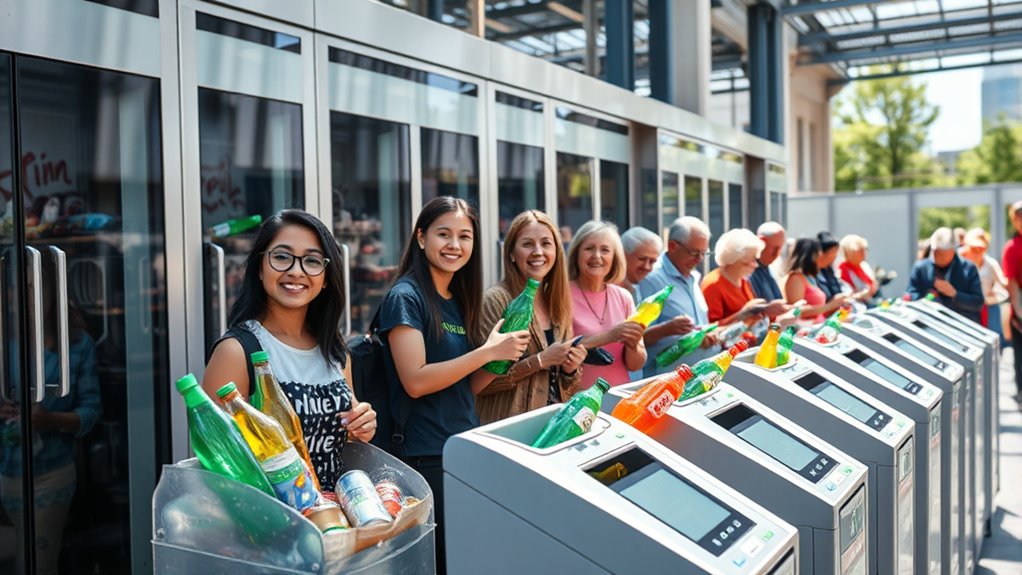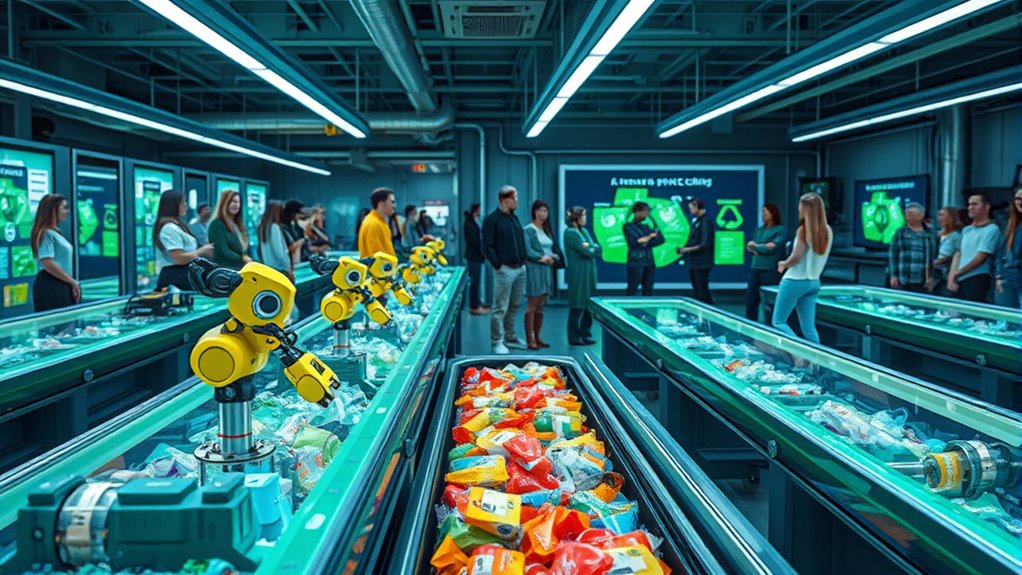Next-generation recycling involves innovative methods like smart bins with sensors, chemical recycling to break plastics down, and apps that connect you to local facilities. These advancements make recycling easier, more efficient, and better for the environment. By participating in these activities—such as using recycling platforms or supporting new techniques—you can actively reduce plastic waste and contribute to a circular economy. Keep exploring to discover how you can take part and make a bigger impact.
Key Takeaways
- Explore advanced recycling technologies like chemical recycling and smart sorting bins to improve waste processing efficiency.
- Use recycling apps and platforms to easily locate local facilities and participate in community recycling events.
- Support innovations by engaging with sustainable waste management initiatives and promoting environmentally conscious habits.
- Contribute to a circular economy by reusing and repurposing materials, reducing reliance on raw resources.
- Stay informed about new recycling methods and advocate for policies that encourage technological advancements in waste management.

Recycling innovations are transforming how communities and individuals approach waste management, making it easier and more appealing to participate. These advancements are not only streamlining the process but also addressing pressing environmental issues like plastic pollution. When you engage with these innovations, you’re contributing to a shift towards a circular economy, where materials are reused and repurposed rather than discarded. This approach reduces the need for new raw materials, cuts down on waste, and helps protect the environment.
Recycling innovations are making waste management easier, helping to reduce pollution and promote a circular economy.
One key innovation is the development of smarter recycling bins equipped with sensors that can identify and sort different types of plastics automatically. Imagine not having to guess whether a plastic bottle is recyclable or not—these smart bins do the work for you. They ensure that more plastics are properly sorted and sent for recycling, decreasing contamination and increasing the efficiency of waste processing. This not only reduces plastic pollution in landfills and oceans but also makes recycling more accessible and less labor-intensive for you.
Additionally, advances in chemical recycling are breaking new ground by allowing plastics to be broken down into their original components, which can then be used to produce new plastics or other materials. This process is vital for creating a more sustainable, circular economy because it keeps plastics in use longer and minimizes waste. As someone who wants to make a difference, supporting or participating in these innovative recycling methods can help reduce the amount of plastic pollution that ends up in our oceans and wildlife habitats.
Another exciting development is the rise of recycling apps and platforms that connect you directly with local recycling facilities, drop-off points, or even recycling events. These tools simplify the process of finding out what can be recycled and where, making it easier for you to participate actively. Many of these platforms also provide educational resources to help you understand the importance of reducing plastic pollution and how your recycling habits contribute to a circular economy. Embracing recycling technology can further enhance your ability to make environmentally conscious choices and support sustainable waste management.
Frequently Asked Questions
How Can I Identify Truly Eco-Friendly Recycling Products?
To identify truly eco-friendly recycling products, look for eco label verification on packaging, which confirms sustainability claims. Check the material’s lifespan; longer-lasting materials reduce waste and environmental impact. Avoid products with vague claims and opt for those certified by reputable organizations. By paying attention to eco labels and considering how durable the materials are, you guarantee you’re choosing genuinely eco-friendly options that support sustainable recycling efforts.
What Are the Costs Associated With Adopting New Recycling Technologies?
Sure, adopting new recycling tech costs a pretty penny, but think of it as an investment in the future. You’ll need a thorough cost analysis to weigh expenses against benefits, including infrastructure upgrades and training. While initial costs might seem steep, strategic investment strategies can help spread out the financial load. Ultimately, this upfront spend boosts sustainability efforts, saving money long-term and improving your eco-impact—who knew green could be so costly?
How Do Regulations Vary Across Different Regions for Recycling Innovations?
Regulations for recycling innovations vary considerably across regions due to policy differences and regional compliance standards. In some areas, strict environmental policies promote advanced recycling technologies, while others have more lenient rules, making it essential for you to stay informed about local policies. This guarantees your efforts align with regional compliance, helping you effectively implement new recycling methods and avoid legal issues while contributing to sustainability goals.
Can Small Businesses Implement Next-Generation Recycling Methods Effectively?
Yes, small businesses can implement next-generation recycling methods effectively. You can start by adopting innovative packaging that’s eco-friendly, reducing waste from the outset. Partner with local recycling programs that support waste reduction initiatives, and educate your team on sustainable practices. Investing in compact, efficient recycling equipment and exploring new waste management technologies will help you stay ahead, making a positive environmental impact while also saving costs in the long run.
What Future Advancements Are Expected in Recycling Materials and Processes?
Imagine a world where waste transforms into new resources—future advancements make this possible. You can expect innovations like biodegradable plastics, which break down naturally, and chemical recycling, turning plastics back into raw materials. These technologies will make recycling more efficient, eco-friendly, and scalable. By embracing these changes, you’ll help reduce pollution and support sustainable practices, creating a cleaner planet for everyone.
Conclusion
Just like a team working together to build something great, your participation in recycling fuels innovation and progress. Every effort you make, no matter how small, adds to a larger movement toward a cleaner, greener future. By staying informed and active, you become part of the solution—helping shape the next generation of recycling. So, take action today and be the spark that ignites change, turning waste into wonder like magic in your hands.









